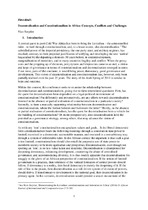| dc.description.abstract | A central quest in post-Cold War Africa has been to bring the Leviathan – the untrammelled
ruler – to heel through constitutionalism, and, to a lesser extent, also decentralisation.
1 The
unbridled power of the imperial presidency, the one party state, and military regimes, has
resulted, contrary to their projected justification of unifying and developing the new ‘nation’
bequeathed by the departing colonisers 30 years before, in underdevelopment,
marginalisation of minorities, and in many countries fragility and conflict. When the proxy
wars and the propping up of dictators, petty tyrants and kleptocrats came to an end, a vision
and hope of governance in terms of constitutionalism and decentralisation emerged in some,
if not most, parts of the continent; it would bring peace, democracy, good governance and
development. This vision of decentralisation and constitutionalism has, however, only been
partially realised over the past 25 years. The story of the Arab Spring of 2011 is similar in
hope and outcome.
Within this context, this conference seeks to examine the relationship between
decentralisation and constitutionalism, giving rise to three interrelated questions: First, has
the quest for decentralisation been dependent on a legal-political environment of
constitutionalism? Put differently and prospectively, are any efforts towards decentralisation
doomed in the absence or partial realisation of constitutionalism in a particular country?
Secondly, is there a mutually supporting relationship between decentralisation and
constitutionalism, where the former bolsters and buttresses the latter? Thirdly, in the absence
or partial realisation of constitutionalism, has the quest for decentralisation been a vehicle for
the building of constitutionalism? Or, more prospectively, does decentralisation hold the
potential as a governance strategy, among others, that may advance the vision of
constitutionalism. | en_US |

